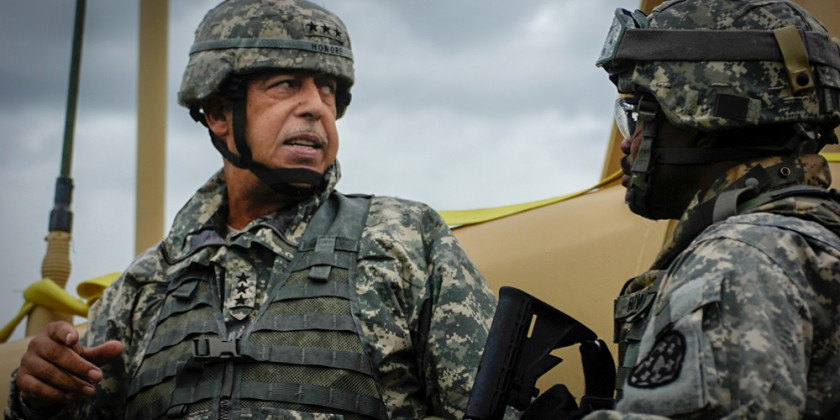Born during a hurricane, Russel L. Honoré grew up as a black man in Louisiana during segregation, but he found his calling in the military. He rose through the ranks to become a Lieutenant General, and when Hurricane Katrina hit New Orleans in 2005 he was the man in charge of the joint military and civilian relief effort.
Katrina has been one of the deadliest hurricanes to ever hit the United States. The tropical cyclone claimed an estimated 1,833 lives in its path. It drowned homes and left countless without shelter in New Orleans, including Russel’s hometown.
According to statistics, the population of the state fell from 484,674 in April 2000 to 230,172 in July 2006, a decrease over 50%. The impact of Katrina forced thousands to start life afresh as New Orleans was underwater.
To get the state on the road to recovery, Russel Honoré saw a huge task ahead of him but remained up to the task he was appointed for.
‘It felt overwhelming to take on that responsibility. People were very emotional. We had a lot of people waiting to be evacuated. A lot of people in America had not seen us in a position where we had become so vulnerable.’
But I can remember the stories my grandfather told me about the flood of 1927. In 1936 when the levees broke, most of the people in Pointe Coupee Parish, in Louisiana, where I lived were evacuated. This had happened before. It just didn’t play out on TV.
Katrina was the first major disaster played out on TV and it became one of the most watched events in America; the Katrina response.’
As the global media watched America brace for recovery like a hawk, on the ground, the pressure to do it right and well, amounted.
‘Opinions were that we were moving too slow which we were and we should’ve been there earlier. We could’ve been there a few hours earlier. What they saw and what was reported to them was that the government was out of touch and was not helping the people which is true in a way but on the other hand there’s good reason.
That storm defeated our capacity because we had about 70,000 people that did not evacuate out of the New Orleans area.’
Russel who flew in over the catastrophe below with the task force says ‘seeing the city in that state was very emotional but it brought my mind to the responsibility we had to save people’s lives and to create a need for speed.’
Among the challenges Russel faced, misinformation was at the hem of it all. One rumour going round was that rescuers in helicopters were being shot at by people on the ground and Russel had to make sure people knew what was actually going on.
‘You had people watch so much television, they believed what they saw on TV. What people were doing was, they would see the helicopter, get out their guns and shoot thinking they could get the helicopter’s attention. That’s in essence what was happening.
So that precipitated a call from the White House asking whether there were snipers active and I gave a call back and said I don’t think they were. White House instructed to do a press conference, go on TV and tell American people that there were no snipers in New Orleans.’
In fact, much of his work on the ground was diffusing tensions on all sides.
‘The troops were coming in bringing food and water to the relief centre. This was on Friday morning of Katrina week and on Thursday evening those who had access to TV and radio had heard the governor telling people not to loot. If they were looting they would be shot.
I took great issue with that and I told the governor, please tell all the first responders not to shoot people.’
The Katrina Task Force continued to evacuate people by air over the next few days. For Russel it was a mission coming to a successful end.
‘We had enough buses come in to take people to the New Orleans airport and fly them out of the city instead of driving them out on buses.
I certainly recognise the collective effort of everybody trying to do their best to keep people alive – all soldiers, navy, and the marines. It’s easier for us to forget because a storm’s coming out as we speak in the Gulf but I do think the City of New Orleans in particular is in better shape now than it ever was before Katrina, in terms of its infrastructure.
But it’s just as vulnerable when it comes to the ability of the storm to flood that city again.’
After 37 years in the army, in 2008, he retired. By then, he had helped many people during natural disasters in Somalia, Venezuela, parts of Central America and the east coast of the United States, mostly flooding.
There is one lesson he has learnt from his experience that will forever be with him.
‘It was clear to me looking at the devastation of hurricanes and floods, that mother nature could destroy anything built by man.
So we take great comfort in our bridges, our dams, great forests in America but all can be burned down, the wind can blow it over or the water can cover it. Mother nature is more powerful than anything built by man.
And we need to respect the power of mother nature’s wrath.’
Russel who leads a different kind of army now, the Green Army, is fighting against pollution and saving the environment.
In addition to that he is also coaching government officials, the private sector and individuals how to adapt to living life during a pandemic.














